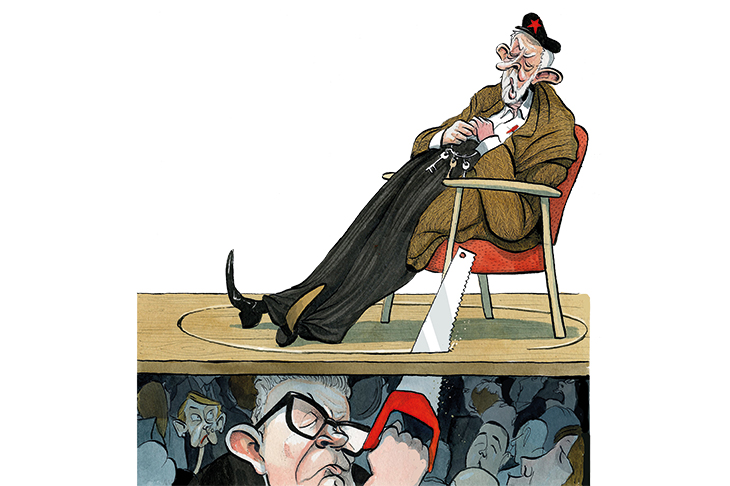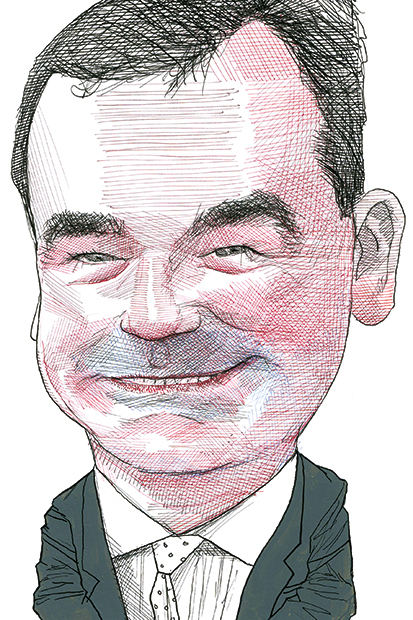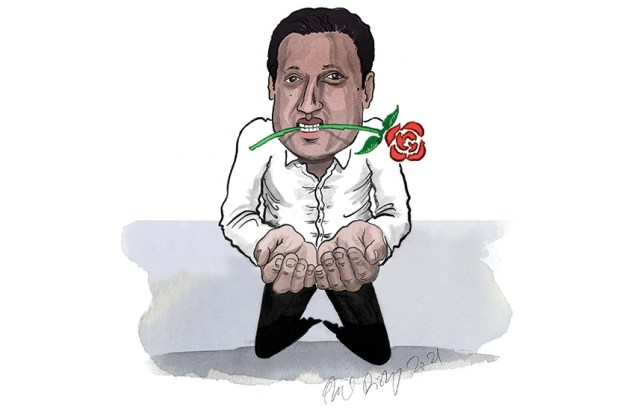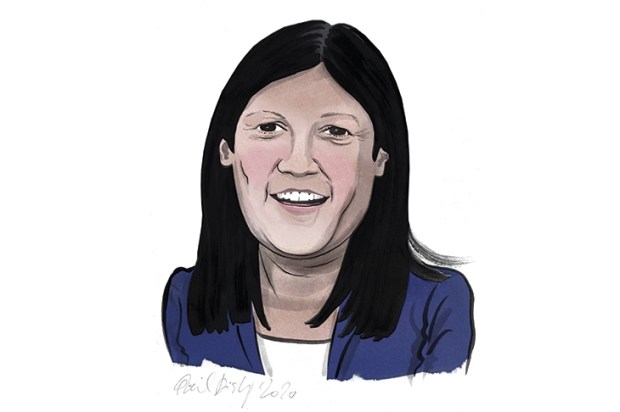Ever since Jeremy Corbyn was elected as leader of the Labour party, many of his MPs have dreamed of deposing him. They’ve tried mass shadow ministerial resignations, a no-confidence motion, even a formal leadership contest — but to no avail. Some, like Chuka Umunna, left the party, hoping (in vain) that others would join their breakaway group. Other MPs gave up hope, resigned and found jobs outside of politics — concluding no plot would ever work. But that might now be changing.
The Corbynites, who have stuck together for so long, are fighting with each other. Party members, once the human shield who protected their leader, are beginning to doubt him. The Labour lords are in open rebellion, and have taken out an advert in the Guardian attacking Corbyn over his failure to deal with anti-Semitism: the Labour party welcomes everyone ‘except, it seems, Jews’, it reads. And MPs are beginning to organise themselves much better having found, in their deputy leader Tom Watson, someone with the skills and the motivation to act. If there is to be a general election this year, it’s not impossible that the Tories — having held a leadership contest to prepare to fight Corbyn — could end up facing someone else.
In May, minds were concentrated after Labour performed poorly in the European elections and was forced into third place by the Liberal Democrats. The party’s ambiguity about Brexit, which had been seen by party members as a price worth paying to keep Leave voters on board, had become a liability, driving voters into the arms of the Lib Dems. Insiders claim that Labour is now losing thousands of members every week over its failure to take a stance. Senior figures such as John McDonnell and Emily Thornberry panicked about what this might mean during a general election, and began calling on Corbyn to change course and make Labour an explicitly anti-Brexit party.
The Corbynites at the top feel flustered, even embattled, which helps explain the scenes we have seen recently: former members of staff threatened with legal action for blowing the whistle on the party’s handling of anti-Semitism, which was exposed in last week’s BBC Panorama. With this has come pressure on Corbyn to remove or sideline his two powerful advisers, Karie Murphy and Seumas Milne.
Even Thornberry, who was previously happy to ride out in support of Corbyn’s wackier policies, now sees value in distancing herself on Brexit, anti-Semitism and the way she talks about dissenters. Her colleagues see her — and her powerful adviser Damian McBride — as a weathervane, someone who will move their support when it is beneficial to do so. Corbyn sees her as a problem and a potential threat, so much so that she was prevented from deputising for him at Prime Minister’s Questions recently.
Perhaps the most significant figure in this latest Labour drama is Watson. As deputy leader, he is an expert in Labour’s power structures, and knows how to shake the tree. Any leader who feels under siege will struggle to govern effectively. As Watson has noticed, if even Corbyn’s allies are unhappy, then there is — for the first time — a chance to get rid of him.
Watson’s attacks are becoming more forceful by the week. As a result, he was given a dressing-down by John Prescott, a former deputy leader, who berated him in front of a room of Labour peers for his alleged disloyalty. In reply, Watson said he’d only managed to get two private meetings with Corbyn this year, and that these were the first meetings the pair had held — without Murphy or Milne hovering protectively — since 2016.
Watson also revealed that after a breakaway group set up their own party in February, he’d written to the leader with suggestions about how to reconnect with MPs. These included a return to shadow cabinet elections and using Corbyn’s social media channels to denounce activists who were abusing MPs in his name. He never received a reply, he told the room. ‘Prescott nearly fell off his chair,’ said one person who was present. ‘He had no idea the situation was this bad, and said he’d been able to wander in and out of Blair and Brown’s offices all the time when he was deputy.’
In Corbyn’s defence, his suspicions about Watson are quite correct. Labour MPs are only staying in the party because they hope Watson’s initiative will lead to a change of leadership. They cannot risk another coup. Everyone who was involved in trying to get rid of Corbyn in 2016 accepts the mechanism they used — a vote of no-confidence in the leader, followed by a contest — only made him stronger. Nor can they rely on pressure caused by defections: Change UK defections earlier in the year only caused temporary inconvenience to the leadership.
The plan this time is to surround and destabilise Corbyn and his lieutenants, until they resign of their own accord. As part of this strategy, MPs thought it important to make a noise after the Panorama broadcast. Realising what was happening, the leadership responded with force. After deploying Carter Ruck lawyers to threaten its ex-staffers, Labour tried to stop the BBC from broadcasting the programme. When Watson complained to Jennie Formby, the party general secretary, Corbynite lieutenants were despatched to form a co-ordinated protective shield around her. They accused Watson of cold-heartedly attacking a woman who was undergoing chemotherapy.
Len McCluskey, leader of the Unite trade union, once shared a flat with Watson but is now the most vocal in his attacks against him — especially over his criticism of Formby. He told the Durham Miners’ Gala last weekend that his former friend has been a ‘fucking disgrace’, a point he repeated on Twitter. But the attacks do nothing to diminish Watson’s standing among MPs, who regard him as their best hope of fighting back.
Corbynites want to paint Watson as a bully who can’t be trusted. But his standing among Labour MPs is very different. He has played many roles in the party’s history: he has been an insurgent and a unifier, a lynchpin and outcast. He was behind the Brownite plot to oust Tony Blair in 2006, something it has taken Blairite colleagues years to forgive. His latest incarnation is a slimmed-down, kindlier man who Labour colleagues — including those Blairites — feel they can turn to with woes about the party. He has lost more than seven stone in just over a year, and also appears to have shed many of his angry, scheming attributes which made so many colleagues scared of him.
He tells friends that he feels ‘zen’. Ask many Labour MPs whether they like him, and they’ll reply with: ‘Oh, I like him now.’ Some pause, looking bewildered, before adding: ‘And I never thought I’d say that.’ Chris Bryant calls him a ‘genuinely caring, well-rounded but ironically slimmer politician — it’s been a beautiful transformation’.
As a result, Watson is now — in effect — a trade union rep for any of his colleagues who want to unite against their unreasonable boss. Labour MPs look to him when the leadership goes too far, like when they tried to reinstate Corbynite ally Chris Williamson after he said the party had been ‘too apologetic’ about anti-Semitism. As night follows day, so an angry Tom Watson letter follows a row between MPs and Jeremy Corbyn. He is credited with stopping at least half a dozen unhappy MPs from leaving the party altogether. His argument was that they should stay and fight. About 20 per cent of voters will stay faithful no matter who the leader or local candidate is, he argued, so any splitter would merely be making it inevitable that a Corbynite would get elected in their place.
Crucially, Watson intends to set up a movement to rival Momentum, the left-wing grassroots organisation that took Corbyn into power. He runs a group called Future Britain, where MPs discuss how to hold the party together. I understand that the group is planning a massive expansion in the next few months, taking in not just more MPs and local government councillors but grassroots Labour members. Watson insists to colleagues that this is more than a faction, and that not everyone needs to agree with him as the leader of the group. The group’s aim is to rebuild confidence among Labour members who want Corbyn gone.
‘It’s a collective pushback, a voice to the members and the voters to say don’t leave, there’s a battle going on,’ says one person who is involved. The hope is that this voice will become so deafening and destabilising, with a blizzard of angry letters and protests against the leadership, that it makes it impossible for Corbyn to continue.
There are many challenges with this new plan, not least when it comes to Watson’s own character. ‘At the heart of him, there’s a mixture of a desire to be in control at all times and a laziness that means he doesn’t always manage it,’ says one foe.
Some MPs blame Watson for the failure of the 2016 coup: he waded in too late and found backbenchers were instead rallying behind an independently minded candidate. ‘We ended up deciding that Angela Eagle was the right person to challenge Corbyn, but Tom wasn’t aware of that and he didn’t like that because he didn’t think he could control her,’ one of the 2016 plotters complains. ‘He said: “Let’s slow this down, let’s wait until people sign nomination papers, I want to discuss this with Len McCluskey.” I don’t think he intended to give Corbyn breathing space by doing this, but that’s what happened. We ended up with Owen Smith.’ Smith gave Corbyn an even bigger majority with Labour members than he’d previously enjoyed.
Watson can’t afford to delay now. There is a real prospect of an election this autumn, no matter how many times Boris Johnson and Jeremy Hunt say they’re ruling one out. Labour plotters are terrified that if they fail to act before an election they might end up with something even worse than a Boris Johnson victory: Corbyn himself becoming prime minister.
Of course, deposing Corbyn is only half the battle: Labour MPs know that there will be no Blairite restoration and that a moderate would never be acceptable to the current party membership. But they think anyone else in the shadow cabinet would probably be better. Many hope for Angela Rayner, shadow education secretary, or Rebecca Long-Bailey, shadow business secretary. Both are sufficiently left-wing to satisfy the membership, but are not factionalists and have better interpersonal skills.
If Watson does get rid of Corbyn, would he try to take the crown himself? Many around him are struck by how he is no longer so quick to anger. He seems calmer — and, in general, more of a leader. He could feasibly lead a group of MPs who resign the Labour whip and become the official opposition. But perhaps what matters most to Watson isn’t that he becomes leader, but that he can steer whoever does.
Got something to add? Join the discussion and comment below.
Get 10 issues for just $10
Subscribe to The Spectator Australia today for the next 10 magazine issues, plus full online access, for just $10.
You might disagree with half of it, but you’ll enjoy reading all of it. Try your first month for free, then just $2 a week for the remainder of your first year.















Comments
Don't miss out
Join the conversation with other Spectator Australia readers. Subscribe to leave a comment.
SUBSCRIBEAlready a subscriber? Log in